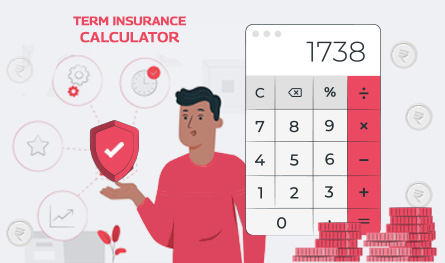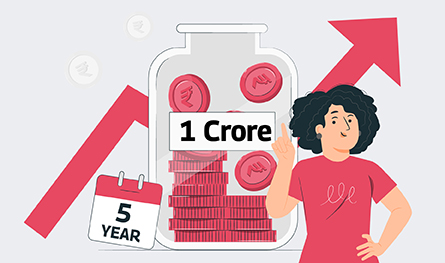Survival Benefit Meaning in Term Life Insurance Policy- A detailed Guide
.png)
.png)
term life insurance policies work as a savior for families in the event of sudden demise of the head earning member. But, do you know what happens if the policyholder survives the policy term? Let’s find out.
Term life insurance policy is a product that allows financial coverage to the insured for a specific time period as per the term of the policy. If the insured dies during such time, the family of the policyholder is paid death benefit by the insurer. However, what if the insured outlives the policy term? Does he receive any survival benefit? Or does he lose his entire money paid as premiums? Let’s take an example to understand this.
Suppose you bought a term insurance plan to secure your family against uncertainties of life in the event of your sudden and untimely demise. However, luckily you survived the term of the plan and outlived the policy. So, now you are worried about your money. Will you get any survival benefit on your policy or you have wasted your money on the plan. The answer is, you will receive money in case you have bought a plan with return of premium option. Let’s understand this in detail below.
What is Survival Benefit meaning?
As indicated by the name itself, survival benefit is the monetary benefit received by the insured at the end of a policy term under the best term insurance plans. However, in this case the policy has to be a return of premium plan under which the policyholder is allowed survival benefits at maturity if he/she outlives the policy tenure. Survival benefit is not generally offered under the normal term plans as they are available only with return of premium plans.
4 Advantages Availed by Buying Term Insurance with Survival Benefits
Below are some advantages of availing term plans with survival benefits:
- A term plan with survival benefits will offer survival or maturity benefits to the insured at the end of the term if the policyholder outlives the plan.
- In case the policyholder dies during the term of the policy, a death benefit is offered to the nominee of the policyholder. This benefit help in supporting the monetary needs of the family and the dependent of the deceased.
- Term plans with survival benefits also allow the policyholder to save money on taxes under section 80C of India’s Income Tax Act, 1961. So, a policyholder can seek tax deductions on all premiums being paid by the insured.
- In addition to the above, these plans allow other optional benefits such as critical illness, accidental death, disability and so on.
Top 10 Features of Term Insurance with Survival Benefits
Here are some features of term plans with survival benefit:
- Survival benefit is due under a policy if the policyholder buys the plan at a within the minimum and maximum entry age of the plan which is 18 years and 65 years respectively
- Most of the best insurance plans with survival benefits allow a 15 to 30 days period of free-lock during which the insured can leave the policy or look for other plans
- The minimum policy tenure of a term plan with survival benefits is 5 years, while the maximum policy term is over 30 to 35 years.
- Term plans with survival benefits allow much flexibility as you can choose a plan that is single-life or joint life insurance plan
- The policyholder needs to pay the premium of survival benefits depending on the sum assured and the insured’s age
- The sum assured of a policy depends on the insurance company as different policy providers offer different sum assured depending on policy terms and conditions
- Every term insurance plan with survival benefit allow a grace Period of 15 to 30 days to renew the policy after the expiry of the plan
- The term plans with survival benefits come with a maturity age ranging from 25 years to 65 – 75 years. This differs as per the particular policy as well as the insurance company
- The term plans with survival benefits allow policy coverage in the form of death benefit and maturity benefit
- These plans are easy to revive if the procedure is done during the revival period of the policy
Best way to choose the Right Term Life Insurance plan with Survival Benefits
The market is flooded with insurance companies offering term plans with survival benefits. Hence, it is important to carry on a research of the plans that are available. Further, you should understand the plans and their features properly before buying them. Buy a plan only when you are sure about it in terms of financial security. Also, do read the terms and conditions of the plan that you want to buy.
Top 5 Plans Offering Survival Benefits:
Here are some best Insurance plans offering Survival Benefits:
- AEGON Life iReturn Insurance Plan – This plan returns all the paid premiums if the policyholder outlives the plan.
- Tata AIA Life Insurance iRaksha TROP – This term insurance policy returns the entire premium amount in case the insured outlives the policy term.
- ICICI Prudential Life Guard Return of Premium – Here again, the policyholder is offered total amount paid as premiums at maturity.
- Aviva iShield Plan – This plan pays 110% of the survival benefit to the policyholder at the end of the policy term .
- Shriram Life Cash Back Term Plan – Even in this case, the policy returns the premium amount at maturity of the policy.
A survival benefit is a benefit that is paid out to the policyholder if they survive the term of the policy. In other words, if the policyholder outlives the term of the policy, they will receive a lump sum payment as a survival benefit.
No, a survival benefit is not included in all term life insurance policies. Some term life insurance policies may include a survival benefit as an optional rider, while others may not offer it at all.
The survival benefit amount is determined at the time the policy is purchased and is usually a percentage of the total premiums paid during the term of the policy. The exact percentage may vary depending on the insurance company and the specific policy.
The survival benefit is paid out to the policyholder at the end of the term of the policy, provided that the policyholder is still alive.
Yes, the survival benefit can be used for any purpose. The policyholder may use the funds to pay for living expenses, medical expenses, or any other expenses they may have.
If the policyholder dies during the term of the policy, their beneficiaries will receive the death benefit as specified in the policy. The survival benefit is only paid out if the policyholder survives the term of the policy.
The tax implications of a survival benefit may vary depending on the country and specific tax laws. In some cases, the survival benefit may be subject to income tax, while in other cases it may be tax-free. It is recommended to consult a tax professional for specific guidance.

Author Bio
Paybima Team
Paybima is an Indian insurance aggregator on a mission to make insurance simple for people. Paybima is the Digital arm of the already established and trusted Mahindra Insurance Brokers Ltd., a reputed name in the insurance broking industry with 17 years of experience. Paybima promises you the easy-to-access online platform to buy insurance policies, and also extend their unrelented assistance with all your policy related queries and services.
Other Life Insurance Products
Latest Post

Let’s be honest – life insurance planning isn’t exactly someone’s weekend hobby. It is the financial equivalent of flossing: we understand its importance, but we tend to put it off. But somewhere between balancing work and life, you might realise you need to have a solid plan in place – just in case.


If you think of life insurance, chances are you are picturing something people buy in their 30s or 40s. But what if you are 65 or older and just getting started? The good news is that you are never too late. Whether you are thinking of easing the financial burden on your family, covering final expenses, or simply leaving behind a legacy, there are life insurance options tailored just for you.
This article will be a guide to life insurance for senior citizens above 65 years, explaining why it is important, the type of insurance options, and how to get the right policy for you.


Health insurance plans are purchased with the hope of medical protection in times of need. However, sometimes it ends up being a source of surprise and disappointment. This mostly happens when people rush to buy health insurance plans, often overlooking essential aspects. Ignoring waiting period clauses, misunderstanding exclusions, and being unaware of sub-limits can lead to unwanted problems in the future.


If you are looking at investment policies offering INR 1 Crore in 5 years, we talk about some excellent plans in this post to help you choose the best one and reach your goal. However, it is important not to get swayed. Doing proper research and taking advice from financial or insurance advisors is important. Learn about such investment plan in this post.

The last few years have made it very clear that having health insurance is essential for everyone. Whether you are a young professional or a senior citizen, are single or have a family to support, health insurance cannot be ignored. Keeping this in mind, health insurance companies offer comprehensive plans that suit people with varied insurance needs.




